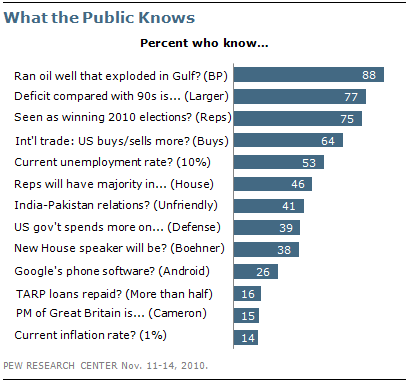Via Fallows, talented musicians Pomplamoose have scored a Hyndai ad:
Just a back-of-the-envelope estimate here, but I'd say that ad will pay for groceries for the next couple of years.
With fewer than 21 days until the end of school forever (or at least until I get the loans paid off), I've spent all my non-work time thinking about entrepreneurship management, emerging market strategy, technology strategy, and environmental economics. Between them I have three papers and one pricing project to complete.
The first paper is almost done, pending comments from one of my sources. I'd go celebrate but I have the other three assignments, you see.
Someday, I'll look back upon this time, laugh nervously, and change the subject.
Via TPM, this Duke project is cool:
This animated interpretation accentuates certain phenomena: the breadth and duration of support for Roosevelt, the shift from a Democratic to a Republican South, the move from an ostensibly east-west division to the contemporary coasts-versus-heartland division, and the stability of the latter.
More broadly, this video is a reminder that what constitutes “politics as usual” is always in flux, shifting sometimes abruptly. The landscape of American politics is constantly evolving, as members of the two great parties battle for electoral supremacy.
 Via Sullivan, the Pew Research Center recently published an alarming survey of Americans' grasp of current events:
Via Sullivan, the Pew Research Center recently published an alarming survey of Americans' grasp of current events:
Nearly eight-in-ten (77%) say correctly that the federal budget deficit is larger than it was in the 1990s and 64% know that in recent years the United States has bought more foreign goods than it has sold overseas. As in recent knowledge surveys, about half (53%) estimate the current unemployment rate at about 10%.
But the public continues to struggle with questions about the Troubled Asset Relief Program known as TARP: Just 16% say, correctly, that more than half of the loans made to banks under TARP have been paid back; an identical percentage says that none has been paid back. In Pew Research's previous knowledge survey in July, just 34% knew that the TARP was enacted under the Bush administration.
Some of these misconceptions might have something to do with Republicans lying about them, of course.
Because they write things that would never get past a typically-craven American news editor, like this:
Substantial rivals for [Rahm] Emanuel['s mayoral candidacy] are surprisingly few. Jesse Jackson junior, a congressman, says he will not run. He has been criticised for ties to a blonde and to Rod Blagojevich, the disgraced ex-governor, thankfully in separate incidents.
My reading list occupies two and a quarter shelves in my living room. No matter. I have another 60 or 70 years left, and I'm on airplanes a lot. I'll admit to a little twinge when I buy a Kindle edition of a print book I already own, but, hey, I'm supporting the arts.
Just added today: from a piece on this morning's Weekend Edition Saturday, Hint Fiction, edited by Robert Swartwood. Start with the Ernest Hemingway original ("For sale: baby shoes. Never worn.") and continue to infra-compact modern stories:
Will Panzo's "The Man Of Tomorrow Or Maybe You've Heard This One Before, But You've Never Heard It Like This"
Dying planet. A boy, a rocket, a last hope. Kansas cornfield crash landing. Ma finds it sleeping in the crater. Pa fetches the shotgun.
J. Matthew Zoss' "Houston, We Have a Problem"
I'm sorry, but there's not enough air in here for everyone. I'll tell them you were a hero.
I've also added Buzz: The Science and Lore of Alcohol by Stephen Braun and The Soul of a New Machine by Tracy Kidder.
My strategy professor excerpted part of the latter for an assignment last week, and I got hooked. The tragedy really hooked me: the book chronicles Data General's push to develop a 32-bit minicomputer...in 1979, three years before IBM released the PC.
Via James Fallows. Simply put, our military occupation of Afghanistan—the police state we've imposed there—has limits on the indignities they'll inflict on the public:
A US Army staff sergeant, now serving in Afghanistan, writes about the new enhanced pat-down procedure from the TSA. Summary of his very powerful message: to avoid giving gross offense to the Afghan public, and to prevent the appearance of an uncontrolled security state, the US military forbids use on Afghan civilians of the very practices the TSA is now making routine for civilian travelers at US airports.
Everything about security involves a balance. "Perfect" security would mean complete controls on freedom, elimination of privacy, etc. Someone who is now exposed to real, daily danger in Afghanistan because of decisions about the proper balance argues that we need to be braver society-wide.
The soldier's note is worth reading.
Security guru Bruce Schneier has great advice about when to change your passwords:
The primary reason to give an authentication credential -- not just a password, but any authentication credential -- an expiration date is to limit the amount of time a lost, stolen, or forged credential can be used by someone else. If a membership card expires after a year, then if someone steals that card he can at most get a year's worth of benefit out of it. After that, it's useless.
... An attacker who gets the password to your bank account by guessing or stealing it isn't going to eavesdrop. He's going to transfer money out of your account -- and then you're going to notice. In this case, it doesn't make a lot of sense to change your password regularly -- but it's vital to change it immediately after the fraud occurs.
... So in general: you don't need to regularly change the password to your computer or online financial accounts (including the accounts at retail sites); definitely not for low-security accounts. You should change your corporate login password occasionally, and you need to take a good hard look at your friends, relatives, and paparazzi before deciding how often to change your Facebook password. But if you break up with someone you've shared a computer with, change them all.
First, I'm starting this at 11:11 on 11-10-10, which is 943 in binary (except in Europe where it's 10-11-10 11:11, or 751 decimal). This bit of randomness was brought to you by the letter "geek" and the number "nerd."
 Now, my real post. Just last night I finished, after two and a half years, the 38 novels in Sir Terry Pratchett's Discworld series, with I Shall Wear Midnight. Sir Terry is still alive and writing, but sadly he has a rare form of early-onset Alzheimer's called posterior cortical atrophy, and may not be able to continue writing. I hope he's able to complete the three or four books he has going right now; he's optimistic as well; but I Shall Wear Midnight may be the last of the series.
Now, my real post. Just last night I finished, after two and a half years, the 38 novels in Sir Terry Pratchett's Discworld series, with I Shall Wear Midnight. Sir Terry is still alive and writing, but sadly he has a rare form of early-onset Alzheimer's called posterior cortical atrophy, and may not be able to continue writing. I hope he's able to complete the three or four books he has going right now; he's optimistic as well; but I Shall Wear Midnight may be the last of the series.
Sir Terry started the novels in 1983. They have a noticeable evolution as he explored new ideas, and picked up some threads and dropped others. I enjoyed every one (some more than others). I might just have to start over from the beginning. Still, I hope to read Snuff and Raising Taxes in the next couple of years.
Anyone catch this Daily Show bit last week?
Well, the dude got fired today:
A hearing that was supposed to be held Tuesday was moved up to this afternoon. Philip Thomas, Shirvell's attorney, said he showed up for the meeting and was read one sentence.
“They said essentially that as a result of Andrew’s conduct, it’s become impossible for him to carry out his duties as an attorney general.”
Thomas said he is shocked and confused, saying he doesn’t know what could have happened between Friday afternoon, when the hearing began, and Saturday afternoon.
Probably what happened, Andy, my friend, is that the Attorney General of Michigan watched the Daily Show bit from last week. Or maybe you lied in your disciplinary hearing. Either way, no one else in the known universe is shocked or confused.